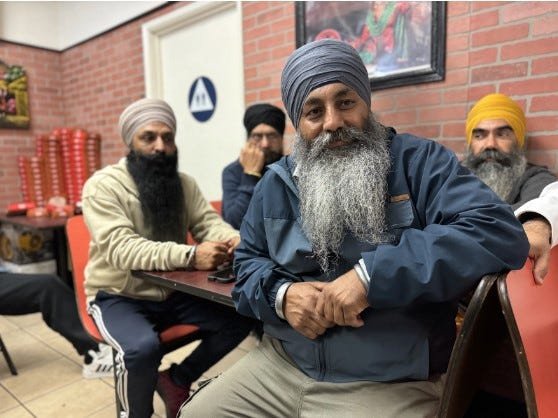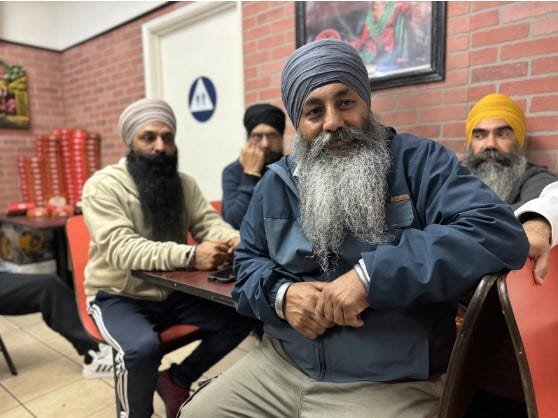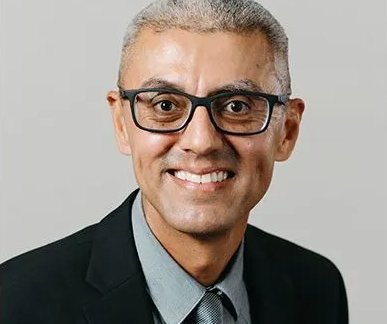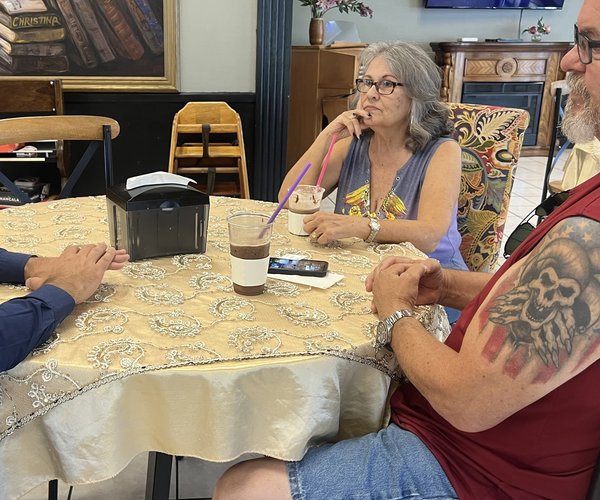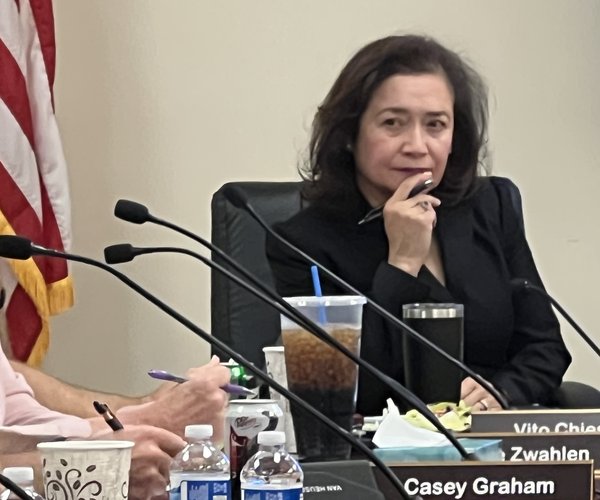BY GISSELLE MEDINA
CV Journalism Collaborative
Gurdeep Shergill doesn’t know who followed him for about 10 days in a black SUV in the fall of 2023.
His fear grew when he learned that his name was one of two discussed in a meeting with top city leaders in October of that year — a meeting he said happened before he began seeing the black SUV in his rearview mirror.
The meeting included Mayor Jerry Dyer and former police Chief Paco Balderrama with a large group of Hindu leaders, aimed at educating local law enforcement and city officials about threats facing Hindu communities across California, first reported by The Sacramento Bee.
According to Balderrama, the Hindu community leaders had accused two Fresno Sikh leaders – Gurdeep Shergill, a local realtor and Fresno Planning Commissioner, and Naindeep Singh, executive director of the Jakara Movement – of ties to organized crime and Khalistan terrorism and suggested they be monitored. Both Balderrama, Shergill and Naindeep Singh confirmed details about the meeting to Fresnoland.
The meeting is an example of what many Punjabi Sikh leaders describe as transnational repression – when a state, in this case India, targets members of diaspora communities, beyond its borders, including those who have migrated to the U.S. and Canada. This can include assassinations, disappearances, and other forms of intimidation or violence.
Shergill and Naindeep Singh support SB 509, a new bill introduced by state Sen. Anna M. Caballero (D-Merced), co-sponsored by Assemblymembers Esmeralda Soria and Jasmeet Bains, aimed at providing formal recognition from the California government and validating these concerns.
The bill would offer local law enforcement agencies culturally inclusive training to be able to recognize and address these threats.
In an emailed statement to Fresnoland, Soria said she supported the bill because she’s had “conversations with many Sikhs from Fresno that involved how there’s been hazing, harassment, threats, and other vile behavior exhibited towards them for simply being Sikh.”
“We can’t overlook what happened last year when the former police chief for Fresno recalled bizarre behavior from Hindu leaders attempting to spread disinformation throughout the brass of Fresno’s Police Department,” Soria added.
Soria continued, “Is that not Transnational Repression? We will NOT tolerate this repression here in California, period.”
Fresnoland reached out to Dyer’s office for comment on Soria’s statement, but he declined to comment.
Balderrama denied that any members of the Fresno Police Department followed Shergill or Naindeep Singh. He also said he did not direct officers to conduct surveillance on the men or investigate them.
“I don’t know who would follow me,” said Shergill. “I mean, I hope Fresno Police weren’t following me. I’m the one who always supports them in the media.”
Shergill, who also hosts a popular radio show on Sikh topics, said some of the people at the meeting had appeared on his program years ago. They included business owners whose nonprofits he once promoted.
Bottom of Form
Fresnoland requested public records from Dyer’s office to confirm who attended the meeting. The city has repeatedly responded with the same message: That it has located relevant records, is reviewing them for possible exemptions, and will provide a follow-up response at a later date.
“A lot of the Indian media will not do coverage, but I will go there,” said Shergill. “They want to silence the independent media. It was kind of disheartening to see that we support them and they’re talking like this.”
Naindeep Singh said that when he learned about the meeting, it felt like an act of transnational repression — especially because the group of Hindu leaders had approached local law enforcement about him and Shergill over their Sikh community work.
Naindeep Singh said he was also followed after the meeting, though he doesn’t know by whom.
While city leaders have acknowledged the meeting, they’ve denied, having anyone followed as a result. Balderrama said they were “probably just paranoid” about being followed, noting that fear was widespread at the time.
In an interview with Fresnoland, Balderrama said that the meeting “served as a crash course about Indian and Khalistan history” but there was “no evidence of anything” and “all information was implied.”
“All the information that they gave us, I thought that they meant well, that they were just trying to inform us,” said Balderrama. “But there was nothing that was actionable. There was nothing that was criminal in nature, they didn’t give me any information that I could take and start an investigation or anything like that.”
He said he also gained a deeper understanding of transnational repression and how it manifests.
Fresnoland reached out to the office of Fresno police Chief Misty Casto for comment about police involvement after the meeting. Casto refused to comment because she was not in attendance at the meeting, which occurred prior to her tenure as chief.
A year after the meeting in question, Dyer wrote on his Facebook page about another meeting, this time with Sikh community members, including Gurdeep Shergill and Naindeep Singh to “discuss their concerns regarding recent national and international incidents targeting the Sikh community.”
“I want to assure our Sikh residents that their safety is a top priority, and I will not tolerate any acts of Transnational repression or threats of violence against them. Fresno stands united against hate and discrimination.”
California’s first attempt at a transnational bill was introduced last year by Assemblymember Jasmeet Bains (D-Delano). Bains, California’s first Sikh state lawmaker, faced criticism for the bill, which proposed requiring the Office of Emergency Services to develop a training program for law enforcement.
The bill failed after strong opposition from Hindu American advocacy groups, who warned it could lead to increased harassment of Hindu Californians by pro-Khalistan activists, according to formal opposition letters and testimonies. They also criticized the bill for giving the Office of Emergency Services the authority to train local law enforcement on identifying “foreign proxies” without clearly defining the term or providing evidence such threats exist in the state.
According to the Sikh Coalition, about 500,000 Sikhs live in the U.S., and California is home to an estimated 250,000, with large populations in the Central Valley and the Bay Area.
How Sikhs began to talk about transnational repression
Harman Singh, executive director of the Sikh Coalition, said that over the past 10 to 15 years, many Sikhs in the U.S. have started speaking out about transnational repression, despite concerns for their safety. However, they previously lacked the language to describe their experiences, as the term “transnational repression” was not widely known.
They also said there was also little concrete evidence from the U.S. government to support claims that Sikhs were being targeted and harassed on American soil. Many conversations around transnational oppression often focus on countries traditionally viewed as adversaries to the U.S., such as China, Russia, and Iran. However, Harman Singh said there has been little discussion about India’s emerging nexus of hate being imported here to target members of the Sikh community.
“One of the more scary and unfortunate aspects of transnational repression is that it’s not just meant to target one or two high-profile individuals,” said Harman Singh. “It is also intended to chill dissent, conversation, and restrict free religious practice for an entire community.”
The assassination of Hardeep Singh Nijjar, founder of Sikhs for Justice, in Vancouver, Canada, in June 2023, was the turning point that led Sikhs to believe the growing trend of transnational repression could be traced back to the government of India. Nijjar was a prominent leader advocating for an independent Sikh homeland, Khalistan.
The Khalistan movement was envisioned by some Sikhs to include the Indian state of Punjab and other Punjabi-speaking areas in northern India. The idea dates back to the 1947 partition of British India, when early proposals for a separate Sikh nation were raised during negotiations leading to the division of Punjab between India and Pakistan.
The Indian government sees the Khalistan movement as a threat to its national unity because it calls for a separate Sikh state. Its strong response is shaped in part by the violent conflict with Sikh separatists in 1984. Authorities have also accused some overseas supporters of fueling unrest with backing from foreign entities.
After Nijjar’s assassination, local law enforcement across the U.S. and the FBI warned several Sikh Americans of threats against them and many California Sikhs reported similar intimidation.
In November 2023, the U.S. Justice Department unsealed an indictment against an Indian national accused of working with an Indian government representative to orchestrate the assassination of a Sikh American. The indictment connected the case to Nijjar’s killing and revealed that at least three additional assassination plots were planned.
On Aug. 11, a drive-by shooting targeting a Sikh activist on Interstate 505 in rural Yolo County near Sacramento prompted The Sikh Coalition to send a letter to Deputy Assistant Attorney General Nicole M. Argentieri, raising concerns that “this attack may have been an act of transnational repression by the government of India (GOI).”
The Sikh community has continued to lead statewide advocacy efforts for protections against transnational repression, including the Fearless for Justice March, a 350-mile journey led by the Jakara Movement in October 2024. The march also called for federal recognition of the 1984 Sikh Genocide.
Harman Singh said California’s long-established Sikh community benefits from strong support networks and deep roots, making it easier to raise concerns—unlike smaller, more isolated Sikh populations where speaking out is harder.
However, Harman Singh said California Sikhs’ organized and vocal advocacy around issues like transnational repression and the Sikh genocide can pose a unique challenge to the Indian government — potentially a greater threat than isolated individuals in other regions who lack the platform or support to speak out.
What would the state bill change?
Puneet Kaur, senior state policy manager at the Sikh Coalition, said the bill would help bridge gaps in local and state law enforcement training by equipping officers, who are often the first to encounter targeted threats, harassment, and other acts of transnational repression, with the tools to recognize and respond effectively.
Kaur and Harman Singh pointed to the August highway shooting that Sikh activists and an intelligence expert said targeted a local Sikh leader in the community. The FBI and California Highway Patrol said in a statement that they did not know if the shooting had anything to do with transnational repression.
“If the California Highway Patrol and state and local law enforcement don’t even know what transnational repression is,” said Harman Singh. “We cannot expect them to effectively address the needs of the community and to effectively protect the community without that additional context.”
In an interview with Fresnoland, Caballero said there has been an increase of threats, intimidation and violence against diaspora communities in California.
“We have a large number of immigrants who come here from all over the world because of conflicts and issues in their own country,” said Caballero. “They come here looking for a better life, and sometimes the issues that cause them to leave their country are brought or are used against them here in this country.”
The bill cleared the Senate’s initial chamber hearings on June 3 and is now moving through Assembly committees. The bill is supported by the California Police Chiefs’ Association.
The hope, Caballero said, is to create a framework that can be used not only in California but also in other states and at the federal level to protect diaspora communities.
Advocates are calling on the U.S. government for targeted sanctions against individuals within India’s intelligence agencies who have been involved in targeting Sikhs in the U.S.— including freezing assets, denying entry into the country, and pausing arms deals with India pending a full review.
“The Sikh Coalition and many others have been still working to pass meaningful legislation at the federal level, and we have yet to see that happen,” said Kaur. “It’s something we’re ongoingly working on, but until that happens, with a new administration, we have even more question marks about when we might see meaningful legislation at the federal level.”
